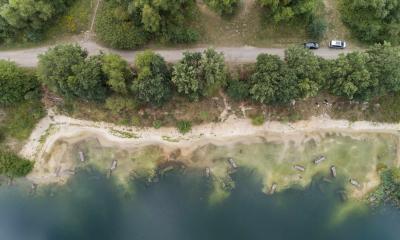Baggersee
Short profile
Duration

Photo: Baggersee / IGB
Due to their low surface area, small water bodies are not covered by the Water Framework Directive. For this reason, they are less regularly targeted by monitoring activities. However, in Lower Saxony, the second largest German state, artificial gravel pit lakes make up a large part of the surface water area.
In the Baggersee project, scientists and stakeholders from the Lower Saxonian angler community are investigating the importance and improvement of small artificial water bodies within the framework of the national biodiversity strategy. The aim is to promote water-bound biodiversity and recreational angling quality in gravel pits. Researchers and representatives of the Angling Association of Lower Saxony jointly carry out habitat improving measures in the relevant waters. The IGB examines the fishery biological effectiveness and monitors whether other organisms benefit from the measures in addition to fish. The actions shall be beneficial for fish, birds, amphibians, dragonflies, aquatic invertebrate and plants, and humans. Also humans shall benefit from an increase in the aesthetic and fishery value of recreational areas on the water.
Project goals:
- Development of reference states in relation to biodiversity for small gravel pits as a basis for fisheries management, nature conservation and restoration
- Implementation of good managerial practice in recreational fisheries management with focus on conservation and habitat management rather than fish stocking
- Establishment of methodical guidelines for the improvement of ecosystem services in small gravel pits that can be implemented independently by local angling clubs
- Protection and improvement of habitats in the littoral zone of gravel pits used for recreational fisheries
- Preservation, protection and rehabilitation of the type-specific aquatic communities in small gravel pits
- Demonstration of the economic value of investments into biodiversity and the resulting ecosystem services with a focus on the littoral zone in gravel pits
- Public outreach and science communication about the ecosystem services and the biodiversity offered by gravel pit lakes
- Establishment of an inter- and transdisciplinary research network among fish ecologists, fisheries ecologists, economists, biodiversity researchers and implementation partners to ensure the sustainability of this important research approach in fisheries sciences

Photo: Baggersee/ IGB

The introduction of deadwood in shallow water zones should improve the habitat quality for aquatic species. | Photo: Baggersee / IGB

Measurement of the waters in which new shallow water zones are to be created. These offer new habitats for aquatic plants, fish and other animals. | Photo: Florian Möllers

The project team also collects the water-bound biodiversity of the quarry ponds, such as birds, dragonflies and amphibians. | Photo: Baggersee / IGB

Photo: Baggersee / IGB
German Federal Ministry of Education and Research (BMBF): Research for Sustainable Development (FONA)
German Federal Ministry for the Environment, Nature Conservation, Building and Nuclear Safety (BMUB) within the Bundesprogramms Biologische Vielfalt (grant numbers 01LC1320A, 01LC1320B and 3514685C20)







